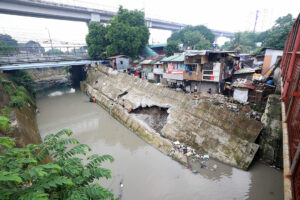By Katherine K. Chan
THE Philippines froze bank accounts and insurance policies tied to 20 Public Works officials and six contractors in a widening probe of anomalous flood control projects, a move that could boost President Ferdinand R. Marcos, Jr.’s anti-corruption drive as he faces pressure to rein in ballooning debt.
The Court of Appeals (CA) approved a freeze order on the assets of 20 Public Works officials and six contractors linked to alleged anomalies in flood control projects, the Anti-Money Laundering Council (AMLC) said on Tuesday.
“The freeze order is a critical step toward the filing of appropriate civil and criminal cases, including the retrieval of any funds moved before the freeze, against those found to have laundered illicit proceeds,” AMLC Executive Director Matthew M. David told a news briefing.
He declined to disclose the value of the frozen accounts.
The freeze order followed a request filed by the Department of Public Works and Highways (DPWH) last week and the case marks the first time the Bangko Sentral ng Pilipinas (BSP) is invoking its expanded powers under the Anti-Financial Accounts Scamming Act (AFASA) to pierce bank secrecy rules.
The graft scandal threatens to further undermine confidence in the DPWH, one of the country’s biggest spending agencies and a driver of Mr. Marcos’s infrastructure push.
Public Works Secretary Vivencio “Vince” B. Dizon said banks had been directed to freeze the assets and vowed more cases would follow. “This is just the beginning,” he said in Filipino at the same briefing.
Among those named in the DPWH’s list are four members of the so-called “Bulacan Group of Contractors (BGC) boys”: former District Engineer Henry C. Alcantara, former Assistant District Engineer Brice Ericson D. Hernandez, Construction Division Chief Jaypee D. Mendoza and Project Engineer Arjay S. Domasig.
Six contractors were also identified, including Cezarah Rowena “Sarah” Discaya and Pacifico “Curlee” F. Discaya II of St. Timothy Construction, Sally N. Santos of SYMS Construction Trading and Mark Allan V. Arevalo of Wawao Builders.
“Preliminary findings of the AMLC point to a possible money laundering scheme involving public funds intended to fund flood control initiatives,” Mr. David said, adding that the probe would be expanded to cover all parties involved.
The DPWH has also asked the BSP to conduct its own probe into the bank accounts linked to the scheme.
“This is the first time BSP is using AFASA to join and assist other agencies in investigating and prosecuting the persons alleged to be involved in these crimes,” BSP General Counsel Roberto L. Figueroa said in a statement. “We are also keen to use this authority to uphold the integrity of our financial system against criminal actors.”
Under AFASA, the BSP may access bank records linked to illicit activity, bypassing bank secrecy and data privacy laws.
Mr. Dizon called the appellate court ruling a “major step” in ensuring accountability. “This is a major step in our road to make the people who did this accountable and to make sure that the people get their money back.”
He added that the government expects to file more cases against other personalities and firms as investigations continue, particularly with the creation of the Independent Commission for Infrastructure (ICI).
President Ferdinand R. Marcos, Jr. created the ICI through Executive Order No. 94, granting it authority to recommend civil, criminal and administrative charges in infrastructure-related anomalies.
